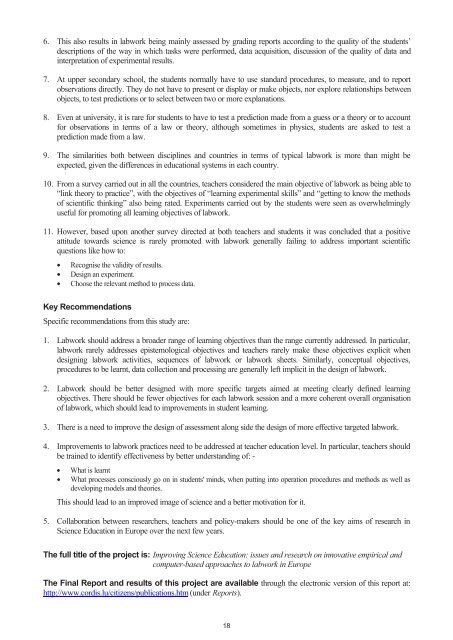briefing papers for policy makers
briefing papers for policy makers
briefing papers for policy makers
Create successful ePaper yourself
Turn your PDF publications into a flip-book with our unique Google optimized e-Paper software.
6. This also results in labwork being mainly assessed by grading reports according to the quality of the students’<br />
descriptions of the way in which tasks were per<strong>for</strong>med, data acquisition, discussion of the quality of data and<br />
interpretation of experimental results.<br />
7. At upper secondary school, the students normally have to use standard procedures, to measure, and to report<br />
observations directly. They do not have to present or display or make objects, nor explore relationships between<br />
objects, to test predictions or to select between two or more explanations.<br />
8. Even at university, it is rare <strong>for</strong> students to have to test a prediction made from a guess or a theory or to account<br />
<strong>for</strong> observations in terms of a law or theory, although sometimes in physics, students are asked to test a<br />
prediction made from a law.<br />
9. The similarities both between disciplines and countries in terms of typical labwork is more than might be<br />
expected, given the differences in educational systems in each country.<br />
10. From a survey carried out in all the countries, teachers considered the main objective of labwork as being able to<br />
“link theory to practice”, with the objectives of “learning experimental skills” and “getting to know the methods<br />
of scientific thinking” also being rated. Experiments carried out by the students were seen as overwhelmingly<br />
useful <strong>for</strong> promoting all learning objectives of labwork.<br />
11. However, based upon another survey directed at both teachers and students it was concluded that a positive<br />
attitude towards science is rarely promoted with labwork generally failing to address important scientific<br />
questions like how to:<br />
• Recognise the validity of results.<br />
• Design an experiment.<br />
• Choose the relevant method to process data.<br />
Key Recommendations<br />
Specific recommendations from this study are:<br />
1. Labwork should address a broader range of learning objectives than the range currently addressed. In particular,<br />
labwork rarely addresses epistemological objectives and teachers rarely make these objectives explicit when<br />
designing labwork activities, sequences of labwork or labwork sheets. Similarly, conceptual objectives,<br />
procedures to be learnt, data collection and processing are generally left implicit in the design of labwork.<br />
2. Labwork should be better designed with more specific targets aimed at meeting clearly defined learning<br />
objectives. There should be fewer objectives <strong>for</strong> each labwork session and a more coherent overall organisation<br />
of labwork, which should lead to improvements in student learning.<br />
3. There is a need to improve the design of assessment along side the design of more effective targeted labwork.<br />
4. Improvements to labwork practices need to be addressed at teacher education level. In particular, teachers should<br />
be trained to identify effectiveness by better understanding of: -<br />
• What is learnt<br />
• What processes consciously go on in students' minds, when putting into operation procedures and methods as well as<br />
developing models and theories.<br />
This should lead to an improved image of science and a better motivation <strong>for</strong> it.<br />
5. Collaboration between researchers, teachers and <strong>policy</strong>-<strong>makers</strong> should be one of the key aims of research in<br />
Science Education in Europe over the next few years.<br />
The full title of the project is: Improving Science Education: issues and research on innovative empirical and<br />
computer-based approaches to labwork in Europe<br />
The Final Report and results of this project are available through the electronic version of this report at:<br />
http://www.cordis.lu/citizens/publications.htm (under Reports).<br />
18


